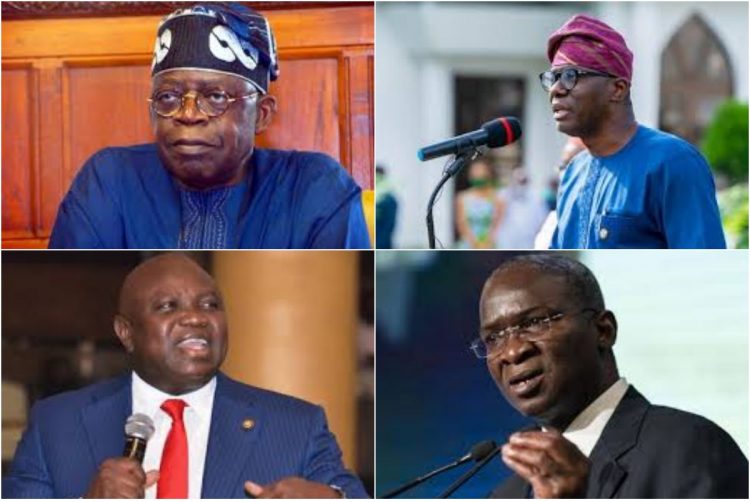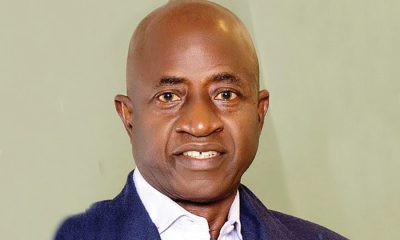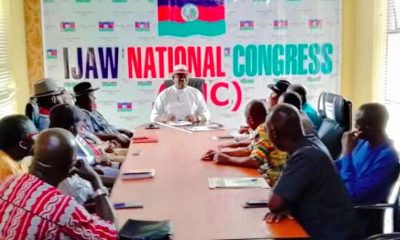Business
Sanwo-Olu moves to stop Tinubu, other ex-govs, deputies’ pensions

Former governors and deputies including Bola Tinubu, Babatunde Fashola and Akinwunmi Ambode, may no longer enjoy pensions if plans to repeal the Public Office Holder (Payment of Pension Law 2007) sail through.
The Lagos State Governor, Babajide Sanwo-Olu, gave the hint on Tuesday when he announced his intention to repeal the Public Office Holder (Payment of Pension Law 2007), which provides for payment of pension and other entitlements to former elected governors and their deputies.
The governor made this known on Tuesday while presenting the 2021 budget to the Lagos State House of Assembly.
He said the bill for that purpose would be sent to the state assembly.
“Mr. Speaker and Honourable members of the house, in the light of keeping the costs of governance low and to signal selflessness in public service, we will be sending a draft executive bill to the House imminently for the repeal of the Public Office Holder (Payment of Pension Law 2007), which provides for payment of pension and other entitlements to former governors and their deputies,” Sanwo-Olu said.
According to the Lagos Pension Law approved by former Governor Bola Tinubu in 2007, a former governor will enjoy the following benefits for life: Two houses, one in Lagos and another in Abuja; even as property experts estimate such a house in Lagos to cost about N500 million and that in Abuja to cost about N700 million.
Other entitlements include: Six brand new cars, replaceable every three years; furniture allowance of 300 per cent of annual salary to be paid every two years; and a pension of N2.5 million monthly amounting to about N30 million pension annually.
The former governor will also enjoy security details, free medicals including for his immediate families.
Other benefits are house maintenance worth 10 per cent of his annual pension; 30 per cent car maintenance; 10 per cent entertainment; 20 per cent utility, and several domestic staff.
Should the new arrangement succeed in Lagos, it would only be following a similar step taken by the Kwara State in 2018 when the state House of Assembly passed an amendment bill halting payment of pensions to former governors, deputy governors, and other political office holders after their tenure.
Former governors and their deputies from almost in all the 36 states of the federation enjoy similar jumbo pay.
A recent report by Blueprint newspaper catalogues a number of states where such largesse in the name of pensions for political office holders after leaving office is ‘legitimised’.
For instance, the report states in Rivers State, the law provides 100 per cent of annual basic salary for ex-governor and deputy; one residential house for former governor to be located anywhere of his choice in Nigeria; one residential house anywhere in Rivers state for the deputy; three cars for the ex-governor every four years; and two cars for the deputy every four years.
Furniture allowance for the governor is 300 per cent of annual basic salary every four years en bloc; as well as 10 per cent as house maintenance allowance.
In Akwa Ibom, the law provides for N200 million annual pension to ex governors and deputies. They enjoy a pension, for life, equivalent to the salary of the incumbent governor and deputy governor respectively.
Similarly, they are entitled to new official car and utility vehicle every four years; one personal aide and provision of adequate security; a cook; chauffeurs and security guards for the governor at a sum not exceeding N5 million per month and N2.5 million for the deputy governor.
There is also free medical service for governor and his spouse at an amount not exceeding N100 million for the governor per annum and N50 million for the deputy governor.
Also, there is a five-bedroom mansion in Abuja and Akwa Ibom and allowance of 300 per cent of annual basic salary for the deputy governor.
The ex-governor also takes a furniture allowance of 300 per cent of annual basic salary every four years in addition to severance gratuity.
The Kano State Pension Rights of Governor and Deputy Governor Law 2007 provides for 100 per cent of annual basic salaries for former governors and their deputies, with a furnished office as well as a six-bedroom house, ‘well-furnished’ four-bedroom for deputy, plus an office.
The former governor is also entitled to free medical service along with his immediate families within and outside Nigeria where necessary. It is same for deputy.
Two drivers are also part of the former governor’s entitlement and a driver for his deputy; and personal staff below the rank of a Principal Administrative Officer and a PA not below grade level 10. There is a provision for a 30-day vacation within and outside Nigeria.
In Gombe, there is N300 million executive pension benefits for the ex-governor.
The Zamfara version of the law, signed in 2006, gives former governors pension for life; two personal staff; two vehicles replaceable every four years; two drivers; free medicals for the former governors and deputies as well as their immediate families in Nigeria or abroad.
The law also gives the former governors a four-bedroom house in Zamfara and an office, free telephone and 30 days paid vacation outside Nigeria.
In Sokoto, former governors and deputy governors are to receive N200 million and N180 million respectively, being monetisation for other entitlements which include domestic aides; residence and vehicles; that could be renewed after every four years.
Section 2 (2) of the Sokoto State Grant of Pension, Governor and Deputy Governor, Law, 2013, states that “the total annual pension to be paid to the governor and deputy governor, shall be at a rate equivalent to the annual total salary of the incumbent governor or deputy governor of the state respectively.”
Railway
Lagos Govt to redesign Oshodi motor park for rail integration

Lagos Govt to redesign Oshodi motor park for rail integration
The Lagos State Government has announced plans to redesign the Oshodi Transport Interchange (OTI) to integrate the facility with the Red Line and Blue Line rail systems, advancing its Rail Mass Transit project.
This initiative aims to deliver seamless connectivity between the two key rail networks and enhance commuters’ experience in Lagos.
The disclosure was conveyed via a statement shared on the official X (formerly Twitter) account of the Lagos State Ministry of Transportation on Saturday, highlighting the need to optimize the design and operations of the OTI to boost efficiency and align with global standards.
READ ALSO:
- Nurse punished in UK for addressing convicted transgender paedophile as ‘Mr’
- Ex-LG chair challenges El-Rufai’s claims on council funds
- Some ladies in movie industry ready to sleep their way to fame — Jide Kosoko
To kickstart the process, the Honourable Commissioner for Transportation, Seun Osiyemi, held a meeting with stakeholders to assess the current state of the interchange and outline strategies for its improvement.
“The Ministry of Transportation sought to address the ongoing developments and challenges affecting the Oshodi Transport Interchange (OTI) in preparedness for the integration of the Rail Mass transit system; Red Line rail project connecting the Blue Line.
“The Ministry recognized that a review of the OTI’s design and operations is essential for its optimization which led to the Honourable Commissioner for Transportation, Oluwaseun Osiyemi meeting with relevant Stakeholders to discuss the current state of the OTI and identify viable solutions that would enhance its operational efficiency in alignment with global standards and Standard Operating Procedures,” the statement read in part.
Lagos Govt to redesign Oshodi motor park for rail integration
Auto
Nigeria’s firm, Weststar Associates, shines in Dubai, wins Daimler Truck EliteClass award

Nigeria’s firm, Weststar Associates, shines in Dubai, wins Daimler Truck EliteClass award
Weststar Associates Limited, Authorised General Distributor of Daimler Truck in Nigeria, has brought honour home all the way from United Arab Emirates specifically at the EliteClass 2024 Season Awards.
Daimler Truck Middle East Africa the Weststar team with the Silver Award in the Elite CSP (Customer Service and Parts) Performance category.
This is contained in a statement issued in Lagos, which added that the EliteClass 2024 Awards ceremony brought together 40 Daimler Truck Business Partners for a night of recognition and celebration.
Held at the One & Only Royal Mirage in Dubai, the prestigious black-tie event honoured top-performing general distributors that have demonstrated exceptional performance, dedication, and commitment to excellence in 2024.
The EliteClass 2024 Awards C
ceremony was the culmination of a year-long EliteClass programme for the Middle East and Africa measuring 24 categories across the entire business spectrum for Mercedes-Benz Trucks, Daimler Buses, and Fuso Trucks & Bus.
The awards highlighted the dedication and resilience of partners who have achieved outstanding performance and a remarkable commitment to excellence and contributed significantly to Daimler Truck’s success in the MEA regions.
President & CEO of Daimler Truck Middle East Africa, Mr. Michael Dietz, emphasized the importance of collaboration and performance-driven success during his opening address. “EliteClass 2024 is more than just an awards ceremony—it is a testament to the hard work, commitment, and shared vision of our partners.
“Their achievements continue to drive our brand forward, setting new benchmarks in customer experience and operational excellence across the region,” he said.
Weststar’s General Manager, Sales, Mr. Christopher Irumudomon, was present at the EliteClass 2024 Season Awards ceremony to accept the Silver Award in the Elite CSP (Customer Service and Parts) Performance category.
While presenting this award, the Daimler Trucks MEA leadership made the following statement: “Congratulations on your achievement in the EliteClass Central Africa 2024 Season. We are pleased to recognize your individual category achievement.”
The EliteClass 2024 Awards reaffirms Daimler Truck’s commitment to excellence, continuous growth, and the recognition of partners who drive success in an evolving industry landscape.
According to the statement, Weststar Associates Limited continues to fly the flag of the “brand with the star” high in Nigeria.
It said the company had remained the go-to home for all Mercedes-Benz needs in this region.
“With a dealership network that expands to the major regions of the country, along with highly trained and experienced sales and after-sales staff. Nigerians can rest assured that they will always have ‘the best or nothing’ at their disposal,” it stated.
Railway
NRC to revive Lagos 2pm MTTS train as Opeifa tours districts

NRC to revive Lagos 2pm MTTS train as Opeifa tours districts
The Nigerian Railwaiy Corporation (NRC) will soon revive its Lagos 2pm mass transit train service (MTTS) in line with the demands of passengers.
Managing Director of the NRC, Dr Kayode Opeifa, disclosed in Lagos, assuring Nigerians of the readiness of the corporation to serve them better.
He spoke at the Iddo Train Station, while addressing train passengers commuting daily from Ijoko and other border communities in Ogun State to Iddo and Idumota axis of the Lagos Island.
A statement by the Deputy Director of Public Relations at the NRC, Mahmood Yakubu, quoted the MD as saying, “NRC management being aware of the centrality of the MTT Kajola to Iddo rail line to the continued prosperity of the Iddo, Idumota and some other big markets in Lagos will not only continue to sustain the line, but work to add addition service after careful commercial market viability and sustainability studies.”
Opeifa was at Iddo Station to assess the available space in preparation for upcoming developmental and revitalization initiatives.
According to him, the transformation of the Iddo Terminal is central to the corporation’s goal to significantly improve the terminal’s infrastructure, optimize its capacity and elevate the passenger experience
He also said the management would urgently embark on the rehabilitation of the coaches to improve the ambience of the interior of the trains and the Iddo stations for better customer experience and patronage.
Opeifa said he would not hesitate to terminate the contract of any contractor not willing or ready to add value to the corporation’s service.
The managing director, who spent some time going round the Iddo Station, also directed the installation of solar panels around the station to better improve the lightening condition, even as he sent the signal that a comprehensive review of all land leases around the station is underway.
Opeifa was nostalgic about the several interesting monuments and railway relics.
He called on corporate organisations and other philanthropists to support the corporation in the area of provision of conveniences for train passengers as part of their corporate social responsibility.
The Railway District Manager (RDM), Engr Augustine Arisa, and District Superintendent, Mrs Chidinma Mba, also informed the MD that the prosperity of the Idumota market is also related to the operations of the MTT line as any day the train does not run, the market feels it.
The NRC MD had earlier commenced his maiden tour of the NRC districts across the country, with a tour to the Running Shed of the corporation at Ebute Metta, which he learnt was a hub to other districts.
He expressed delight at the industry of ironmen (women engineers and technicians) working in the corporation who are competing with their male counterparts in ensuring that all the nation’s rolling assets are in serviceable conditions.
The tour took him to the store, where Opeifa directed that the management must commence the painting of several legacy buildings of the corporation across the country.
He added that the corporation was determined to improve its image as a frontline mobility service provider and the hub for logistics services in the country.
Opeifa who observed that there are no scraps in the railway, reiterated earlier calls on Nigerians to beware of anyone vandalizing the rail materials across the country, adding that security agencies especially the Nigeria Security and Civil Defence Corps (NSCDC) had been directed to prosecute anyone caught vandalizing any rail assets.
He said the corporation would put back to shape as many narrow gauge locomotives still serviceable and would deploy them across the country to serve passenger traffic anywhere the corporation had existing train lines just as the Federal Government would aggressively continue to invest and expand the national standard gauge corridor.
The tour also took the managing director to the Battery Room, as well as the laboratory, an inspection of all the mechanical fluids which was a crucial facility responsible for analyzing the quality and integrity of mechanical fluids used in NRC rail operations.
He assured the laboratory that the management under his watch would continue to support their growth and development as he himself trained and once worked as an analytical chemist.
The tour also took Opeifa to Agege Station where he had a closed door meeting with officials from the Lagos Metropolitan Area Transport Authority (LAMATA), led by the Director Rail Services Engr Olasunkanmi Okusaga, on how to firm up security challenges between the two stations Babatunde Raji Fashola Station and the Lagos State Train Station at Agege Station.
Opeifa who was led round by the Agege Station Manager, Mrs Ese Asowata, went round to check the station’s conveniences, the VIP Lounge, the control room, the ticketing lounge and administrative sections among others.
The managing director took time to address the concerns of some train passengers, one of them, Olatunde Apata, who complained of what could be done for any passenger who missed his train. Apata, who was heading to the Prof. Wole Soyinka Station, in Abeokuta, Ogun State, had missed his train because he went to pray.
Addressing all challenges Opeifa directed that under no circumstances should the ticket not work to relief passengers with disability access the train.
He equally said efforts were being made to see how the issue of those missing their train would be addressed even as he disclosed that the NRC and LAMATA were working at how to ensure passengers could co-switch and access the metro train to continue their journey from the stations.
-

 metro2 days ago
metro2 days ago‘We’re not hiring,’ NNPC denies viral recruitment adverts
-

 metro2 days ago
metro2 days agoNatasha: Court blocks recall attempt, stops INEC
-

 Sports2 days ago
Sports2 days agoOdegbami speaks on Osimhen breaking his 44-year goals record
-

 metro3 days ago
metro3 days agoMore trouble brews in Rivers as Ijaw congress considers self-determination option
-

 Entertainment2 days ago
Entertainment2 days agoI didn’t snatch Asake’s mother from her husband -Musibau Alani
-

 Sports2 days ago
Sports2 days ago2026 WCQ: Super Eagles move up to third place with 2-0 win in Rwanda
-

 metro2 days ago
metro2 days agoBoko Haram attacks military base in Adamawa
-

 metro2 days ago
metro2 days agoOluwo accuses Ooni of plotting to dethrone him














You must be logged in to post a comment Login